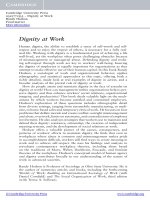Dignity at Work by Randy Hodson Frontmatter doc
Bạn đang xem bản rút gọn của tài liệu. Xem và tải ngay bản đầy đủ của tài liệu tại đây (123.92 KB, 13 trang )
Dignity at Work
Human dignity, the ability to establish a sense of self-worth and self-
respect and to enjoy the respect of others, is necessary for a fully real-
ized life. Working with dignity is a fundamental part of achieving a life
well-lived, yet the workplace often poses challenging obstacles because
of mismanagement or managerial abuse. Defending dignity and realiz-
ing self-respect through work are key to workers’ well-being. Insuring
the dignity of employees is equally important for organizations as they
attempt to make effective use of their human capital. In this book Randy
Hodson, a sociologist of work and organizational behavior, applies
ethnographic and statistical approaches to this topic, offering both a
richly detailed, inside look at real examples of dignity in action, and a
broader analysis of the pivotal role of dignity at work.
How do people attain and maintain dignity in the face of assaults on
dignity at work? How can management within organizations help to pre-
serve dignity and thus enhance workers’ social relations, organizational
integrity, and productivity? This book sheds valuable light on the mech-
anisms by which workers become satisfied and committed employees.
Hodson’s exploration of these questions includes ethnographic detail
from diverse settings, ranging from automobile manufacturing, to medi-
cine, to home-based sales and temporary clerical work. He focuses on four
problems that deflate morale and create conflict: outright mismanagement
and abuse, overwork, limits on autonomy, and contradictions of employee
involvement. He also analyzes strategies that workers use to maintain and
defend their dignity: resistance, citizenship, the creation of independent
meaning systems, and the development of social relations at work.
Hodson offers a valuable picture of the causes, consequences, and
patterns of workers’ efforts to maintain dignity. He finds that even in
workplaces where abuse is common and mismanagement makes pride
in accomplishment difficult, workers still find ways to create meaning in
work and to achieve self-respect. He uses his findings and analysis to
reevaluate contemporary workplace theories, including those based
on the traditions of Marx, Weber, Durkheim, Foucault, and feminist
theories of the workplace. Hodson’s conceptual model of human agency
and dignity contributes broadly to our understanding of the nature of
work in advanced societies.
Randy Hodson is Professor of Sociology at Ohio State University. He is
the author of numerous articles and books, including the forthcoming
Worlds of Work: Building an International Sociology of Work (with
Daniel Cornfield) and The Social Organization of Work, third edition
(with Teresa A. Sullivan).
© Cambridge University Press www.cambridge.org
Cambridge University Press
0521771315 - Dignity at Work
Randy Hodson
Frontmatter
More information
Dignity at Work
Randy Hodson
Ohio State University
© Cambridge University Press www.cambridge.org
Cambridge University Press
0521771315 - Dignity at Work
Randy Hodson
Frontmatter
More information
PUBLISHED BY THE PRESS SYNDICATE OF THE UNIVERSITY OF CAMBRIDGE
The Pitt Building, Trumpington Street, Cambridge, United Kingdom
CAMBRIDGE UNIVERSITY PRESS
The Edinburgh Building, Cambridge CB2 2RU, UK
40 West 20th Street, New York, NY 10011-4211, USA
10 Stamford Road, Oakleigh, VIC 3166, Australia
Ruiz de Alarcón 13, 28014 Madrid, Spain
Dock House, The Waterfront, Cape Town 8001, South Africa
© Randy Hodson 2001
This book is in copyright. Subject to statutory exception
and to the provisions of relevant collective licensing agreements,
no reproduction of any part may take place without
the written permission of Cambridge University Press.
First published 2001
Printed in the United States of America
Typeface Sabon 10/12 pt. System QuarkXPress [BTS]
A catalog record for this book is available from the British Library.
Library of Congress Cataloging in Publication Data
Hodson, Randy.
Dignity at work / Randy Hodson.
p. cm.
Includes bibliographical references and index.
ISBN 0-521-77131-5 – ISBN 0-521-77812-3 (pb.)
1. Work. I. Title.
HD4904. H62 2001
306.3¢6–dc21 2001018483
ISBN 0 521 77131 5 hardback
ISBN 0 521 77812 3 paperback
© Cambridge University Press www.cambridge.org
Cambridge University Press
0521771315 - Dignity at Work
Randy Hodson
Frontmatter
More information
To workers everywhere
whose dignity can be challenged
but cannot be denied.
© Cambridge University Press www.cambridge.org
Cambridge University Press
0521771315 - Dignity at Work
Randy Hodson
Frontmatter
More information
Contents
List of Figures and Tables page x
Preface xiii
Part I Dignity and Its Challenges
1 Four Faces of Working with Dignity 3
The Quest for Dignity 5
Safeguarding Dignity 16
Denials of Dignity 19
Conclusions 20
2 Toward a Theory of Dignity 22
Alienation, Anomie, and Bureaucratic Rationality 22
Modern Industrial Society 29
Obstacles and Opportunities 34
Working with Dignity 41
Conclusions 49
3 Measuring the Subtle Realms of Work 50
Organizational Ethnographies 51
A New Method and New Insights 53
Strategies for Safeguarding Dignity 59
Denials of Dignity 73
Conclusions 80
Part II The Practice of Dignity
4 Deflecting Abuse and Mismanagement 83
A History of Mismanagement and Abuse 83
Direct Personal Supervision 87
Workplace Norms against Mismanagement and Abuse 91
Responses to Abuse 99
vii
© Cambridge University Press www.cambridge.org
Cambridge University Press
0521771315 - Dignity at Work
Randy Hodson
Frontmatter
More information
Responses to Mismanagement 105
Social Group Differences 110
Conclusions 113
5 Avoiding Overwork 115
Assembly Work 119
Monotony, Exit, and Resistance 124
Lost Opportunities for Citizenship 131
Social Group Differences 134
Conclusions 138
6 Defending Autonomy 140
Professional and Craft Autonomy 141
The Experience of Professional and Craft Work 146
Citizenship in Professional and Craft Work 152
Resistance in Professional and Craft Work 157
Organizational Size and Outside Ownership 161
Social Group Differences 165
Conclusions 168
7 Negotiating Employee Involvement 171
The Varieties of Participation 172
Work Life under Employee Involvement 181
Employee Involvement and Resistance 187
Employee Involvement and Citizenship 189
Social Group Differences 193
Conclusions 195
8 Coworkers – For Better or Worse 200
The Social Context of Work Life 200
Coworkers and the Meaning of Work 203
Solidarity and Infighting 205
Coworker Relations under Bad Management 213
Coworkers in Assembly Jobs 220
Job Autonomy and Workplace Relations 222
Participation and Coworker Support 225
Conflict and Tension in Service Work 228
Coworker Relations across Social Groups 230
Conclusions 231
Part III The Future of Dignity
9 Worker Dignity and Well-Being 237
A Synthesis 237
Infighting, Resistance, and Citizenship 241
viii Contents
© Cambridge University Press www.cambridge.org
Cambridge University Press
0521771315 - Dignity at Work
Randy Hodson
Frontmatter
More information
Dignity and Well-Being 246
Conclusions 256
10 Dignity, Agency, and the Future of Work 259
What Have We Learned? 259
Theoretical Implications 264
The Classics Revisited 268
Implications for Organizations 269
Ethnographies as Data 270
Conclusions 273
References 274
Appendix A A Brief History of the Workplace
Ethnography (W.E.) Project 299
Appendix B Workplace Ethnography Data Set 303
Appendix C Supplemental Tables 307
Index 311
Contents ix
© Cambridge University Press www.cambridge.org
Cambridge University Press
0521771315 - Dignity at Work
Randy Hodson
Frontmatter
More information
Tables and Figures
x
Tables
1.1 Dignity at Work page 17
3.1 Resistance Measures 61
3.2 Worker Citizenship Measures 69
3.3 Direct Supervision and Resisting Mismanagement
and Abuse 74
3.4 Production Technology and Excessive Work Demands 75
3.5 Management Control and the Defense of Autonomy 76
3.6 Organizational Participation and the Pursuit of
Meaningful Involvement 78
4.1 Working under Direct Supervision 88
4.2 Management Abuse Measures 94
4.3 Mismanagement Measures 97
4.4 Working under Reduced Hours 103
4.5 Working under Incompetent Management 109
4.6 Abuse, Mismanagement, Worker Resistance, and
Citizenship across Social Groups 111
5.1 Assembly Work 119
5.2 Monotony, Exit, and Resistance on the Assembly Line 125
5.3 Reduced Citizenship in Assembly Work 132
5.4 Work Experiences, Resistance, and Citizenship across
Social Groups 135
6.1 Autonomy in Professional and Craft Settings 147
6.2 Pride and Citizenship in Professional and Craft Work 152
6.3 Resistance and Conflict in Professional and Craft Work 158
6.4 Employment Size and Alienation 162
6.5 Citizenship and Resistance in Locally Owned
Enterprises 163
6.6 Autonomy, Resistance, and Citizenship across
Social Groups 166
7.1 Employee Involvement and Working Conditions 182
© Cambridge University Press www.cambridge.org
Cambridge University Press
0521771315 - Dignity at Work
Randy Hodson
Frontmatter
More information
7.2 Resistance under Employee Involvement 187
7.3 Citizenship under Employee Involvement 190
7.4 Employee Involvement, Resistance, and Citizenship
across Social Groups 194
8.1 Worker Solidarity Measures 207
8.2 Coworker Conflict Measures 210
8.3 Coworker Relations under Abusive Management 213
8.4 Coworker Relations under Mismanagement 217
8.5 Coworker Relations and Assembly Work 220
8.6 Coworker Relations under Various Forms of
Workplace Control 223
8.7 Coworker Relations and Worker Participation 225
8.8 Coworker Relations and Customer Service Work 229
8.9 Coworker Relations across Social Groups 231
9.1 Regression of Worker Infighting, Resistance, and
Citizenship on Workplace Characteristics 242
9.2 Regression of Worker Well-Being on Workplace
Characteristics and Worker Agency 247
Appendix 1 Resistance Scale 307
Appendix 2 Citizenship Scale 307
Appendix 3 Management Abuse Scale 308
Appendix 4 Mismanagement Scale 308
Appendix 5 Worker Solidarity Scale 308
Appendix 6 Coworker Conflict Scale 309
Figures
3.1 Resistance as strategy 67
3.2 Citizenship as application of knowledge 71
4.1 Management abuse, worker resistance, and citizenship 100
4.2 Mismanagement, worker resistance, and citizenship 105
5.1 Absenteeism and assembly work 126
5.2 Extra effort and assembly work 133
6.1 Creativity in professional and craft work 149
6.2 Insider knowledge and peer training in professional
and craft work 155
6.3 Work avoidance and social sabotage under outside
ownership 164
7.1 Skill and autonomy in participatory workplaces 183
7.2 Mismanagement and abuse in participatory workplaces 185
7.3 Cooperation in participatory workplaces 192
8.1 Worker responses to management abuse 216
List of Figures and Tables xi
© Cambridge University Press www.cambridge.org
Cambridge University Press
0521771315 - Dignity at Work
Randy Hodson
Frontmatter
More information
8.2 Coworker relations in mismanaged workplaces 219
8.3 Group discipline under various forms of worker
participation 227
9.1 Conceptual model of worker dignity and well-being 239
9.2 Job satisfaction 250
9.3 Creativity at work 253
9.4 Meaningful work 255
xii List of Figures and Tables
© Cambridge University Press www.cambridge.org
Cambridge University Press
0521771315 - Dignity at Work
Randy Hodson
Frontmatter
More information
Preface
Working with dignity is a foundation for a fully realized life. Despite
many denials of dignity faced daily in the workplace, people still strive
to do their best, to take pride in their work, and to defend themselves
against indignities from employers, and sometimes from coworkers. New
challenges are constantly being created for working with dignity by the
inexorable process of technological and organizational change and by
the unrelenting drive of market systems for profit maximization.
In spite of the centrality of the quest for dignity at work by billions of
workers around the world, the pursuit of dignity is rarely a central focus
of scholarly writings on the workplace. The challenges to workers’ well-
being posed by technological, organizational, and market forces are
sometimes a focus. However, rarely do we consider the very serious
business of how workers respond to these challenges on a daily basis in
the office suite and on the shop floor. The creative and purposive activi-
ties of employees to achieve dignity at work are the central focus of this
book. I hope that by considering these activities we can gain a better
understanding of the daily struggle for dignity at work and the central
place it occupies in workers’ lives.
I rely on data from a systematic analysis of the population of organi-
zational ethnographies. These data provide an empirical base for study-
ing the quest for dignity. The in-depth observations offered by workplace
ethnographies provide a unique source of information on organizational
life that has previously been underutilized.
The inspiration for this book was provided by the work lives and the
quest for dignity of many different people. These people include friends,
family, acquaintances, employees at offices and factories where I have
worked, visited, or toured, and the many students with whom I have dis-
cussed workplace issues including our own and other’s quests for dignity
at work. I hope this book will be helpful to those who read it and who
may see their own struggles reflected in it.
The efforts of many people combined to make this book possible.
I would like to thank the men and women in the accounts analyzed here
xiii
© Cambridge University Press www.cambridge.org
Cambridge University Press
0521771315 - Dignity at Work
Randy Hodson
Frontmatter
More information
who allowed themselves to be interviewed and who spoke candidly and
eloquently about their lives at work and their struggle for dignity. I would
also like to thank the ethnographers who spend so many months and years
observing work life and reporting on it in clear and often moving terms.
A special thanks goes to the research staff and students of the Indiana
University Sociological Research Practicum who worked on the research
project in which we coded the organizational ethnographies. Their
probing questions, good will, and enthusiasm resulted in the sort of
collective intellectual experience that is too rare in the hurried world of
university life. I would like, in particular, to thank Sandy Welsh,
Sabine Rieble, Sean Creighton, and Cheryl Sorenson Jamison.
A number of people offered useful comments and constructive criti-
cisms on the project. I am particularly indebted to Dan Cornfield, P. K.
Edwards, Bill Form, Craig Jenkins, Garth Massey, Judith Stepan Norris,
Vincent Roscigno, and Mike Wallace. Mary Child and the reviewers for
Cambridge University Press offered excellent editorial guidance through-
out the project for which I am also grateful. Finally, I am especially
indebted to my wife and partner, Susan Rogers, for sage advice on all
matters concerning work, life, and dignity.
This book contains new material and also represents an expansion and
synthesis of some of my previous work. Earlier versions of some mater-
ial have appeared in: “Is Worker Solidarity Undermined by Autonomy
and Participation?” (with Sandy Welsh, Sabine Rieble, Cheryl Sorenson
Jamison, and Sean Creighton) American Sociological Review (Vol. 58,
1993); “Worker Resistance,” Economic and Industrial Democracy (Vol.
16, 1995); “Dignity in the Workplace under Participative Management,”
American Sociological Review (Vol. 61, 1996); “Group Relations at
Work,” Work and Occupations (Vol. 24, 1997); “Pride in Task Com-
pletion and Organizational Citizenship Behaviour,” Work and Stress
(Vol. 12, 1998); “Organizational Ethnographies,” Social Forces (Vol. 76,
1998); Analyzing Documentary Accounts, Quantitative Applications
in the Social Sciences, #128, (Sage 1999); “Organizational Anomie
and Worker Consent,” Work and Occupations (Vol. 26, 1999); and
“Management Citizenship Behavior,” Social Problems (Vol. 46, 1999).
Acknowledgments
Permission has been granted for selected use of material from the
following:
From Women on the Line by Ruth Cavendish, Copyright © 1982 by
Ruth Cavendish. All rights reserved. Reprinted by permission of
Routledge and Kegan Paul, Boston, Massachusetts.
xiv Preface
© Cambridge University Press www.cambridge.org
Cambridge University Press
0521771315 - Dignity at Work
Randy Hodson
Frontmatter
More information
Preface xv
From Forgive and Remember by Charles Bosk, Copyright © 1979 by
University of Chicago Press. All rights reserved. Reprinted by permission
of the author and The University of Chicago Press.
From Managing in the Corporate Interest: Control and Resistance in an
American Bank by Vicki Smith. Copyright © 1990 by Vicki Smith.
All rights reserved. Reprinted by permission of the University of
California Press.
From Chaos on the Shop Floor by Tom Juravich. Copyright © 1985 by
Temple University. All rights reserved. Reprinted by permission of
Temple University Press.
© Cambridge University Press www.cambridge.org
Cambridge University Press
0521771315 - Dignity at Work
Randy Hodson
Frontmatter
More information









